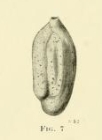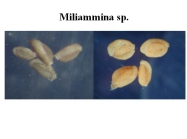RAS taxon details
Miliammina Heron-Allen & Earland, 1930
112356 (urn:lsid:marinespecies.org:taxname:112356)
accepted
Genus
- Species Miliammina arenacea (Chapman, 1916) (accepted > unreplaced junior homonym, Primary junior homonym of Miliolina arenacea Rhumbler, 1906)
- Species Miliammina earlandi Loeblich & Tappan, 1955
marine, brackish, fresh, terrestrial
recent + fossil
feminine
Heron-Allen, E.; Earland, A. (1930). Some new foraminifera from the South Atlantic, Part 3. <em>Journal of the Royal Microscopical Society.</em> 50: 38-45., available online at https://doi.org/10.1111/j.1365-2818.1930.tb01474.x
page(s): p. 41 [details] Available for editors
page(s): p. 41 [details] Available for editors
Hayward, B.W.; Le Coze, F.; Vachard, D.; Gross, O. (2025). World Foraminifera Database. Miliammina Heron-Allen & Earland, 1930. Accessed through: RAS (Eds.) (2025) Register of Antarctic Species at: https://ras.biodiversity.aq/aphia.php?p=taxdetails&id=112356 on 2025-09-13
RAS (Eds.) (2025). Register of Antarctic Species. Miliammina Heron-Allen & Earland, 1930. Accessed at: https://ras.biodiversity.aq/aphia.php/aphia.php?p=taxdetails&id=112356 on 2025-09-13
Date
action
by
2006-09-25 06:54:45Z
changed
Martinez, Olga
original description
Heron-Allen, E.; Earland, A. (1930). Some new foraminifera from the South Atlantic, Part 3. <em>Journal of the Royal Microscopical Society.</em> 50: 38-45., available online at https://doi.org/10.1111/j.1365-2818.1930.tb01474.x
page(s): p. 41 [details] Available for editors
context source (Deepsea) Murray, J.W. (2006). Ecology and applications of benthic foraminifera. <em>Cambridge, UK, Cambridge University Press.</em> 426pp., available online at http://www.cambridge.org/9780521828390 [details] Available for editors
basis of record Gross, O. (2001). Foraminifera, <B><I>in</I></B>: Costello, M.J. <i>et al.</i> (Ed.) (2001). <i>European register of marine species: a check-list of the marine species in Europe and a bibliography of guides to their identification. Collection Patrimoines Naturels,</i> 50: pp. 60-75 (look up in IMIS) [details]
additional source Neave, Sheffield Airey. (1939-1996). Nomenclator Zoologicus vol. 1-10 Online. <em>[Online Nomenclator Zoologicus at Checklistbank. Ubio link has gone].</em> , available online at https://www.checklistbank.org/dataset/126539/about [details]
page(s): p. 41 [details] Available for editors
context source (Deepsea) Murray, J.W. (2006). Ecology and applications of benthic foraminifera. <em>Cambridge, UK, Cambridge University Press.</em> 426pp., available online at http://www.cambridge.org/9780521828390 [details] Available for editors
basis of record Gross, O. (2001). Foraminifera, <B><I>in</I></B>: Costello, M.J. <i>et al.</i> (Ed.) (2001). <i>European register of marine species: a check-list of the marine species in Europe and a bibliography of guides to their identification. Collection Patrimoines Naturels,</i> 50: pp. 60-75 (look up in IMIS) [details]
additional source Neave, Sheffield Airey. (1939-1996). Nomenclator Zoologicus vol. 1-10 Online. <em>[Online Nomenclator Zoologicus at Checklistbank. Ubio link has gone].</em> , available online at https://www.checklistbank.org/dataset/126539/about [details]
 Present
Present  Inaccurate
Inaccurate  Introduced: alien
Introduced: alien  Containing type locality
Containing type locality

